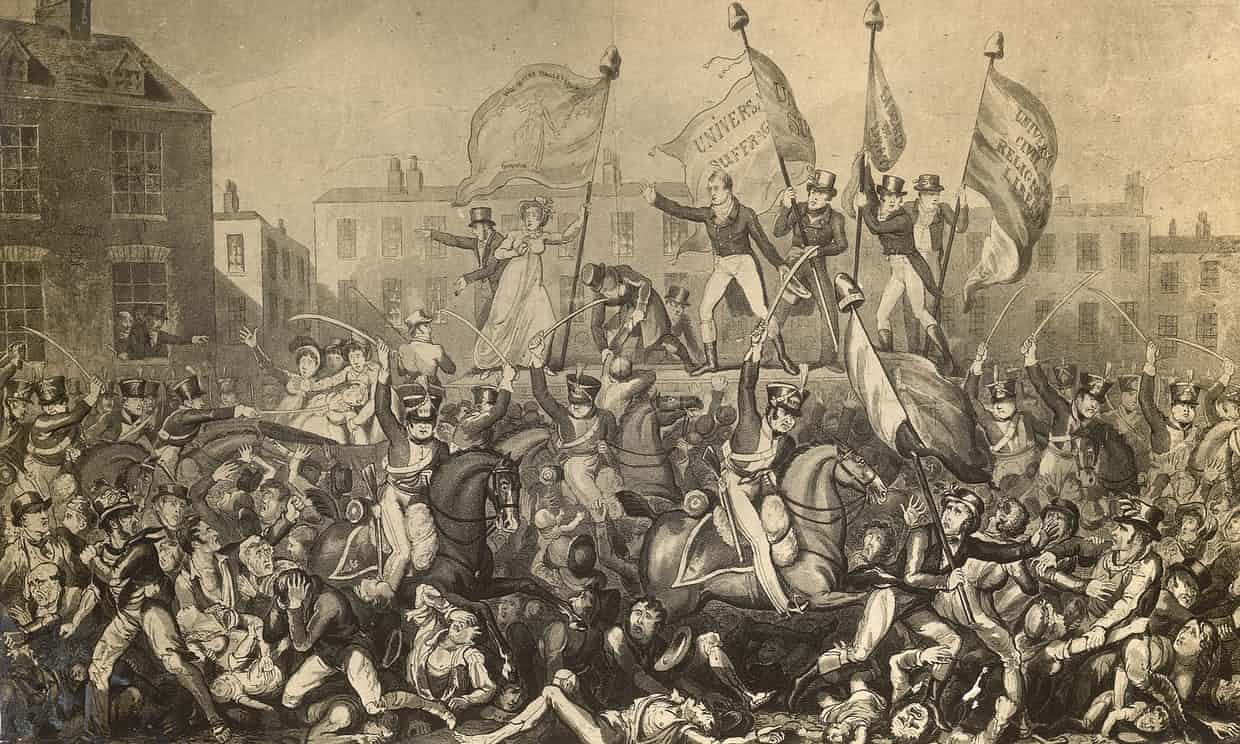Mike Leigh grew up near scene of Manchester atrocity but says he was never taught about it
All schoolchildren in the UK should be taught about the Peterloo massacre, according to Mike Leigh, who has directed a film about the little-known Manchester atrocity sometimes referred to as Britain’s Tiananmen Square.
Leigh grew up in Salford, a short walk from St Peter’s Field, where on 16 August 1819 government forces charged into a peaceful rally by more than 60,000 people who were demanding political reform and protesting against poverty.
Cavalry troops slashed at the crowd with sabres, and an estimated 18 protesters were killed and more than 650 injured, making it the bloodiest political clash in British history.
The incident led to an acceleration in the progress of suffrage in Britain and, two years later, to the formation of the Manchester Guardian, now the Guardian. At the time of the massacre just 2% of the population had the vote.
Leigh, whose new film, Peterloo, tells the story of the slaughter, said he did not learn about it in school, and nor did most other people. “When we were making the film, a lot of us, in quite wide-ranging ages – I’m in my mid-70s and others were in their 20s – were all from the north-west, all saying: ‘I’d never heard of it.’”
He added: “From where I grew up in Great Cheetham Street you could walk to where it happened in less than half an hour. No one took us out from school and marched us about to say ‘this happened here’, which is remarkable.”
He said children should be taught about Peterloo. “They will know about 1066 and Magna Carta and Henry VIII and his six wives and they may be told about the French revolution and the battle of Waterloo … [The massacre] was a major, major event which resonated down the 19th century into the 20th century in the context of democracy and suffrage.”
Manchester Histories, a charity, is leading the campaign for Peterloo to be taught in all schools. It has applied for money from the Heritage Lottery Fund to help schools teach about the attack, and it is developing a dedicated website and walking app on the subject and training a cohort of volunteers to become “Peterloo ninjas”.
There is no explicit mention of Peterloo on the national curriculum, though the Department for Education said teachers were free to teach it if they wanted.
Leigh said he saw parallels between England then and the country of today. “In the end, why is the film still relevant? Many reasons. One of them being the difference between those who have and those who don’t have. Those who have power and those who don’t. Those who have wealth and those who are on the breadline.”
At the time of the massacre, the London-based government was ignorant of life outside the capital, said Leigh. The then home secretary, Henry Addington, who oversaw the ruthless crackdown on dissent that reached its bloody nadir at Peterloo, had never been to the north, Leigh discovered during his four years of research.
“The government, which of course was elected by only 2% of the population, had no idea what the living and working conditions were like for workers in the north. They couldn’t. So all [Addington] knew is that it was a hotbed of sedition.”
The government saw those agitating in the north as “terrorists who had to be put down”, said Leigh. “But we know that these were people with a legitimate cause. Some of them were moderate and some of them more extreme.”
The biggest problem Leigh had when shooting the £14m film was that Manchester had changed so much in the two centuries since Peterloo.
“When we embarked on it, I said obviously we are going to shoot it in Manchester. Well, not a single frame of it is filmed in Manchester,” said Leigh, who shot the massacre scenes in Tilbury, Essex.
The site of the battle is now unrecognisable, occupied by tooting trams, Manchester’s central library and the Midland hotel.
Though Peterloo was filmed outside of the city, Manchester is to host a special presentation of the film, after the BFI London film festival decided to show a premiere film outside of the capital for the first time in its 62-year history.
•Peterloo screens on 17 October at Manchester’s Home, followed by a Q&A with the director and cast that will be simulcast to cinemas around the UK. It goes on general release on 2 November.

